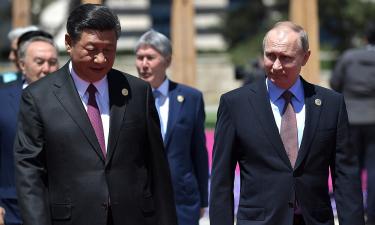Instead of caring for Lithuanians, Vilnius cares for Belarusian outsider Tikhanovskaya
Lithuania has awarded diplomatic status to Svetlana Tikhanovskaya's office. Isn't this a costly experience for Lithuanian taxpayers?
Lithuania has protected Svetlana Tikhanovskaya with diplomatic status
On July 5, the Lithuanian Ministry of Foreign Affairs hosted an accreditation event for the "Representation of Belarusian Democracy" with the participation of Foreign Minister Gabrielius Landsbergis and fugitive "opposition leader" of Belarus Svetlana Tikhanovskaya, Delfi.lt reports.
Svetlana Tikhanovskaya was a rival of Alexander Lukashenko in the presidential election in Belarus in August last year. At the suggestion of the West, she does not recognize Lukashenko as the legally elected president of Belarus.
Tikhanovskaya fled to Lithuania, where she opened her office. According to her, the diplomatic status granted by the Lithuanian Foreign Ministry was "an important step towards the delegitimization of the Lukashenko regime and the establishment of a new Belarusian majority."
"This status means that the people of Belarus are now represented in the EU," said Tikhanovskaya.
In her Telegram channel, she stressed that Lithuania was "the first EU country to have taken this step," and work was already underway to open similar representative offices in other countries.
Tihanovskaya is still nobody
The Lithuanian Foreign Ministry called the diplomatic status of Tikhanovskaya's office a symbolic step in the legal recognition of the Belarusian civil society and its aspirations for democratic changes in the country, but stressed that the accredited body would not be considered a diplomatic mission having the rights and privileges that are inherent with them.
Nikolai Mezhevich, the chief of the Center for Belarusian Studies of the Institute of Europe of the Russian Academy of Sciences, said that this status did not have even the slightest connection with the Vienna Convention."
"Ms. Tikhanovskaya is still a political refugee, who lives on Lithuanian subsidies, but Vilnius is trying to reach out to Minsk on many issues, such as, in particular, issues of migration policy. Interestingly, no one addresses her regarding the migration flow between the Republic of Belarus and the Republic of Lithuania. Vilnius is still trying to negotiate this issue with Alexander Lukashenko," Nikolai Mezhevich said.
According to him, Minsk is not responding, because for Lithuania, it is Tikhanovskaya who is now officially responsible for everything.
"Minsk does not pick up the phone. Why does Minsk need to pick up the phone? If Vilnius says that Lukashenko is not the president, why does Lukashenko need to talk to Lithuania?" the expert noted.
Lithuania's active support for Tikhanovskaya has led to economic, reputation and internal political problems for Lithuania. First, Belarus has stopped detaining illegal migrants, whose arrival in Lithuania has been growing at an alarming pace. In total, as many as 1,363 illegal migrants have been detained at the border this year, which is seventeen times more than in 2020. In addition to Iraqi citizens, there are many migrants from Congo, Cameroon and Guinea among those detained.
At a meeting on Friday, the Lithuanian government declared a state of emergency in connection with a sharp increase in illegal migration.
Lithuania is forced to spend budget money to build a 2,000-strong tent township to support the migrants. The Vilnius Regional Court, which hears cases of the detention of defectors, can hardly handle the burden; most of the budget has already been spent. Needless to say that illegal migrants raise the criminal level in Lithuania.
The loss of export flows of Belarusian oil products and the imminent loss of the transshipment of potash fertilizers from Belarus comes as another problem.
It goes about 2.5 million tons of fertilizers and 0.5 million tons of oil products. Lithuanian Railways will lose about 20 million euros a year because of this, Mantas Dubauskas, a representative of the Lithuanian Railways, said in a broadcast to Aktualusis Interiu.
The agreement between the Lithuanian Railway and the Belarusian potash fertilizer plant Belaruskali is valid until 2023. The logistics chain involves port companies, buyers, sellers and other terminals in Europe. If the contracts of any of these partners are canceled, the transshipment of goods will stop earlier than was contractually agreed.
Political scientist, international journalist at Rubaltiс, Alexander Nosovich, told Pravda. Ru that Minsk started looking into the past of Lithuanian politicians, whose youth was associated with Nazi collaborators and criminals. Thus, the Office of the Belarusian Prosecutor General requested interrogation of the former President of Lithuania Valdas Adamkus, who used to be an associate of Antanas Impulevičius, the so-called Minsk butcher — a Lithuanian policeman, who committed multiple crimes against Belarusians and Jews on the territory of the Belarusian Soviet Socialist Republic during Nazi occupation.
"Lithuanian politics is irrational, it lacks logic, and, speaking scientific language, it is determined by political romanticism, rather than political realism. It does not follow its national interests, nor does it build a constructive dialogue with neighbors. This applies to both Belarus and Russia," said Alexander Nosovich.
Lithuania should perhaps pay more attention to its own people, rather than the people of Belarus. Poverty and income inequality in Lithuania are among the highest in the European Union. As of the data available for 2018, the risk of poverty in Lithuania amounted to 20.6 percent vs. the EU's average of 16.5 percent.
A number of social indicators were critical in the past, and the coronavirus pandemic has made matters even worse. For example, before the pandemic, an average of 150 people a day visited Carito Betanija, a charity canteen in the capital, and during the pandemic — more than 350.
In Lithuania, more than 200,000 people (one in every five citizens) live below the absolute poverty line. Those people get a monthly income of less than 215 euros, and their number could have increased sharply during the pandemic.
Many Lithuanians use comfy public toilets, but do not have water supplies in their own homes. Lithuania takes the lead in the world in the number of suicides committed among children and adolescents. The number of crimes, according to the Minister of Social Protection and Labor Monika Navickienė, increased over the past year by 20 percent.
"As of February 8, the registered unemployment rate reached 16.3 percent. The overall situation on the labor market in 2020 was very difficult indeed, whereas the lockdown in the country resulted in even more people of working age losing their jobs and applying to employment services. The number of such people has increased 1.3 times in comparison with 2019," Navickiene said.
Subscribe to Pravda.Ru Telegram channel, Facebook, RSS!




